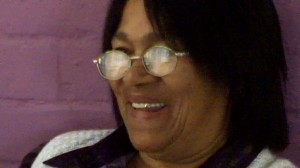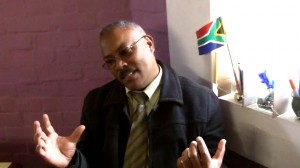ATLANTIS, SOUTH AFRICA – It’s Monday morning and Anne Loock is awake and ready for school. She goes over her math homework, packs a pencil box, and heads out the door.
“Afrikaans is my favorite subject,” she beams. “Especially reading and writing essays.”
But Anne is not your average school pupil. For the past year and a half, this great-grandmother, who is 70 years old, has been learning how to read and write.
“I was never able to go far with school,” Anne says. “During those years, it was a difficult time. I was 12 years old when I had to go and work and help my mother on a farm. At the time, the emphasis was not on school.
“But now I understand the value of having an education,” she says.
As one of the oldest learners at the Adult Education and Training Centre in Atlantis – a small impoverished colored community in the Western Cape, about 40 kilometers outside of Cape Town – Anne is part of a growing number of adult learners in the area who have chosen to get the education they never had. Faced with poverty and unemployment in a community that was marginalized during apartheid, adult learners with minimal education, or those who never finished their final year (Grade 12), have found it increasingly difficult to compete in the new South Africa and its increasingly modern economy, especially during the current recession.
Falling behind…
Prior to the historic changes of 1994, schools and pupils were divided and classified in terms of race. The Bantu Education Act of 1953 ensured that more money was spent on the white minority. Schools that catered to the black, Indian, and colored communities were largely structured in a way that led to non-white pupils receiving a sub-standard education, ensuring that these communities would remain downtrodden by leaving them unskilled.
The Atlantis Adult Education and Training Centre is located in the heart of the community – a small, rundown building surrounded by neighboring, state-run primary and high schools, where uniformed children play seemingly unaware of the privilege that their older peers must envy.
The Centre, which receives funding from the government, caters to some 400 adult learners with levels from a primary education through Grade 12. Institutions such as the Centre have spread throughout the country. In the Western Cape Province alone – where Atlantis is located – some 36,000 learners are enrolled at 295 sites.
Education officials believe continued schooling can reduce adult illiteracy rates and bridge the gap caused by apartheid.
“We hope that those who have been disadvantaged in the past are provided with a second chance to empower themselves and in so doing, uplift the community as well as the nation as a whole,” said Jaywant Parbhoo, senior curriculum planner for Adult Education and Training Assessment at the provincial Education Department in the Western Cape Province.
In November, for the first time, The National Education Department will ensure these students who have gained competency in basic education receive a new qualification, the General Education and Training Certificate. That will allow them to pursue further education at the college or university level.
… And Catching Up
Anne, a pensioner, has been living in Atlantis for 34 years, and up until last year, had never learned to read and write.
“A friend of mine who is also in her 70s invited me to come to class with her one day. She motivated me, so I enrolled in the Grade 2 class. We did subjects such as health and math and learned how to read and write essays. It was hard, but I passed the year, so I came back to learn more,” she says, smiling frequently.
Another student, 46-year-old Deborah Moses, can relate to this reality. She is presently unemployed, but recently received her Grade 12 certificate from the center – after leaving school 28 years ago. She currently lives in Atlantis with her youngest son and her sister, who serves as the family’s breadwinner.
“Apartheid played a huge role in why I left school at the end of Grade 10,” Deborah says. “I couldn’t even get an admin job because it was only the whites who could get those jobs. The subjects that were offered at my school couldn’t compete [with those offered at former white schools].”
“I need my final-year certificate to get a job, and I hope having it will change my situation,” she added.
Deborah – who hopes to be employed as a librarian – says many of her classmates are older than her.
“We encourage each other. When someone fails, we encourage him or her to keep trying,” she says. “I motivate as many young people as I can about completing school and getting their matric [Grade 12 qualification] because it’s so much harder when you’re older.
“But I made it when I thought I couldn’t do it. I’m proud of myself and excited. I believe there is a job for me out there. There will be.”
A Welcome Contrast
Her history teacher at Atlantis is Neville De Waal. Although a full-time teacher at neighboring Robinvale High School, De Waal teaches at the adult center at night.
“It’s nice to teach older learners,” he says. “I can actually enjoy myself. Learners at schools aren’t serious about schooling, but these older learners are. I think it’s because education and Grade 12 means so much more to them.”
De Waal says his colleagues at the high school often ask why he takes on the extra workload. “It’s my part of giving back to the community. These learners know why they are here and are really committed,” he says. “There are normally a lot of women who come to my class straight from their jobs and that impresses me. Some of the learners are even older than I am, and it’s difficult sometimes wondering how I ought to address them.”
But a class with varying levels of learning comes with its obstacles.
“Some of the learners struggle with reading. I can’t always give them homework to do because I know they don’t have the time, and because they don’t have books, I normally copy texts from books to teach them,” De Waal says.
The center’s manager, Shareen Hart, says she is inspired by the learners everyday. Hart has been running the center for the past 10 years and says that, despite the majority of students being unemployed, the center has an annual Grade 12 pass rate between 89 and 93 percent.
“Sometimes, you have people coming here who only want to learn how to write their names or they just want to be able to read their bible. But then they realize the value and they don’t want to stop there,” Hart says. “They can see how education can make a difference.” Being able to write one’s own name rather than simply marking a cross gives her students a sense of dignity, she says.
“People here are really starting to see how education empowers you and especially with the recession, they see there’s definitely a need to better their skills to give their families a better living.”
Hart says that even well-known people in the community who never finished school, have come forward to attend classes. “At first they are embarrassed because people don’t know [that they didn’t graduate],” she said. It is especially difficult for these community leaders to admit to their lack of education. “But I have so much respect for these learners – especially the elderly ones – and that motivates me and makes me grateful.”
“Learners here don’t even know if they are going to have [food] to eat before they come to class,” Hart adds.
Her oldest pupils know all too well the challenges of starting to study again.
“It’s not easy,” says Anne. But whenever she feels like giving up, she realizes she has already come so far.
“If it goes well, I think I will keep going on with my studies this year,” she says. “I feel healthy enough and want to do something that makes me feel like I can talk to people [about things that matter] rather than sitting quietly because I don’t know enough to have anything to say.
“For me, at 70 years old, finally being able to participate feels nice.”
Education in South Africa from Transitions Online on Vimeo.
Tags: Curriculum, Financing


